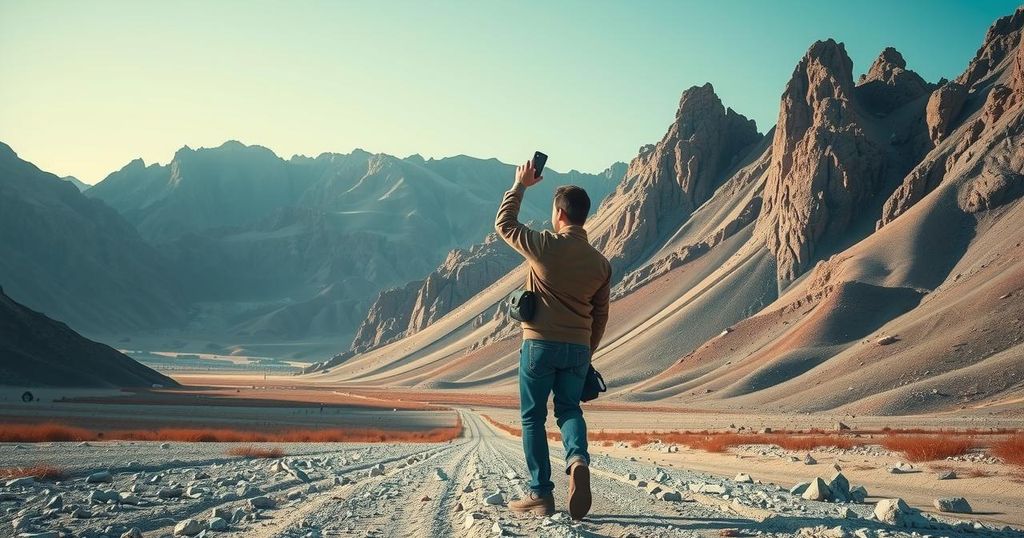Courage at a Cost: Sudan’s Journalists Report Amidst War’s Darkness

Journalists in Sudan face extreme peril as they strive to report on the ongoing war, especially in Darfur. Many have died, been tortured, or displaced since the conflict began between the army and RSF in April 2023. Despite immense risks and lacking support, some reporters are determined to share the stories of those suffering, highlighting their courage amid dire circumstances.
In a dire effort to shed light on the ongoing crisis in Sudan, particularly in war-torn Darfur, local journalists are taking extraordinary risks to report the brutal realities. One of their methods includes scaling mountains near the Sudan-Chad border, struggling to find a signal to send out news reports despite a two-year communication blackout. This is part of their commitment to broadcasting the horrific accounts of sexual violence and mass killings that plague their country.
Since the conflict sparked between the Sudanese army and the paramilitary Rapid Support Forces (RSF) in April 2023, at least 28 journalists have tragically lost their lives, based on figures from Sudan’s journalist union. Furthermore, many reporters have faced abduction and torture, while countless others have been displaced and cut off from essential services like power and internet.
Noon, a 35-year-old freelance journalist who spoke under a pseudonym for safety reasons, had to flee her home in El-Geneina due to the life-threatening retaliation after reporting on heinous mass killings targeting the Massalit community by the RSF. “They raided my family’s house. They took all my equipment, my cameras, everything,” she recounted. After surviving multiple raids, she sought refuge almost 1,800 kilometers away in Gedaref, only to experience further fear and conflict there.
In a grim turn of events, while reporting from a displacement shelter, she was detained by army forces on accusations of collaboration with the RSF. Journalists Without Borders noted that since the conflict’s initiation, over 400 journalists have fled Sudan, which has become a perilous environment for media personnel, trailing only Gaza in terms of reporter fatalities last year.
Despite the peril, some journalists refuse to abandon their roles. Ibrahim, a 30-year-old photojournalist operating undercover in North Darfur, expressed the dire need for credible reporting amid famine and violence. “No one can know what I do,” he admitted, highlighting the stakes involved. After being tortured for five days by RSF fighters and losing access to his equipment, he continues to persevere with limited resources, using only his mobile phone for reporting.
Even the situation for seasoned reporters living through the war has transformed drastically. Youssef, a 62-year-old journalist from Al-Jazira, has been forced to grow crops and raise goats to make ends meet, as his profession is barely sustainable now. “The last salary I received was at the beginning of 2024,” he explained, revealing the deep impact of the conflict on his life and work.
As conditions worsen, both he and Ibrahim have found no support from media organizations, be they local or international. Yet, Ibrahim keeps moving forward by converting a coffee shop in Tawila into an improvised newsroom. “Who else will tell the world what’s happening in Darfur if we leave?” he questioned. With his phone connected to a makeshift charging setup, he emphasized the urgency of their mission: “No one else will tell these stories. No one can imagine the atrocities happening here.”
The situation for journalists in Sudan, particularly in Darfur, remains dangerously precarious as they continue to document the conflict’s horrifying realities. Local journalists like Noon, Ibrahim, and Youssef illustrate the enormous risks they face—whether it is fleeing from violence or reporting under constant threat. Despite the challenges and lack of support, their determination to tell the world about the atrocities unfolding in their homeland exemplifies their critical role in the ongoing fight for truth in a time of crisis.
Original Source: www.rfi.fr







